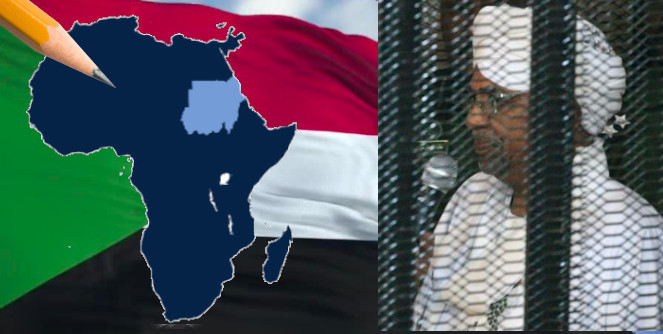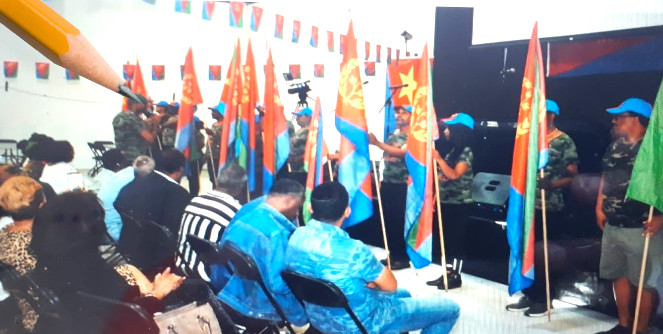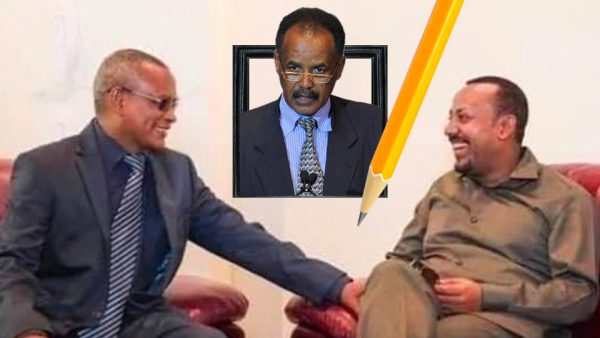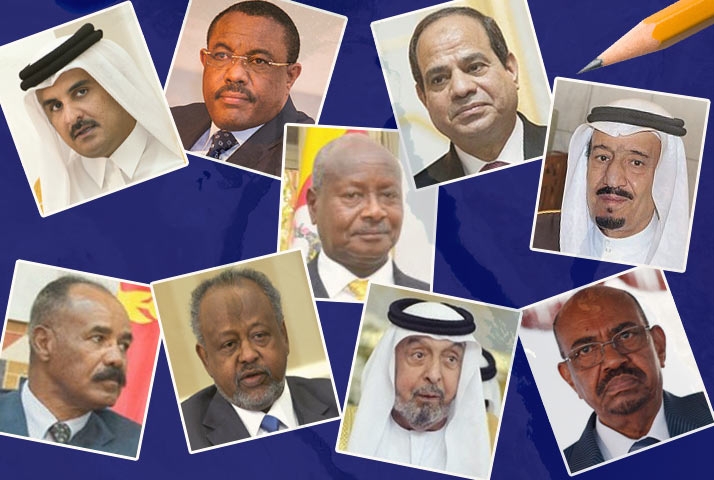Sudan: Omar Al Bashir Faces The Natural Fate

Since the end of the colonization period, the Middle East and the Horn of Africa region has been a fertile ground for breeding dictators. Its countries seemed perpetually locked up in a competition on who produces the worst dictator. Surprisingly, the endless neck to neck race didn’t produce a single winner. They all won.
Finally, Omar Al Bashir, the deposed president, the Dancing Queen of Sudan, lost. They lowered him from the podium and made him sit on a wooden throne, inside a metal cage. He is not likely to dance again anytime soon.
Al Bashir came to court accompanied by an entourage similar to the one that accompanied him during the last thirty years. A convoy of military cars with heavily armed guards escorted him like a wounded animal to a Khartoum court where he told the judge of his address: Kober prison! That is where he has been staying since the military deposed him in April.
The Sudanese News Agency reported, as expected, the 75-year old Al Bashir told the court about the source of a stash of money in grain sacks found in his possession. In June, the chairman of the military council had confirmed it seized more than $100 million cash money in different currencies at Al Bashir’s residence.
According to reports, Al Bashir admitted in court that he received $90 million from Saudi Arabia. Of course, Saudi Arabia, the generous donor, the new big daddy of the region’s dictators. However, the throng of about 80 lawyers defending Al Bashir has rejected the accusation of “illicit gain” charge against their client.
The court also discovered the Saudi heir apparent has sent Al Bashir installments of cash through Sudanese expatriates living in Saudi Arabia. They must have appeared at the airport pretending to be carrying gifts of Mecca Zemzem water from MBS. The Saudi faucet in Al Bashir’s residence has been spitting dollars since 2015 when the late King Abdalla ruled Saudi Arabia. A smaller faucet had also spitted at least $1 million from a UAE sheikh.
A Sudanese activist commented, “the stash of different currencies found in Al Bashir’s residence gave the impression he runs a currency-exchange business on the side.”
The ex-Sudanese dictator will have to present more explanations when he visits the court again. He will probably make more visits to the court, more than a patient visits his dentist for a root canal treatment. Major charges will likely be thrown at him: the Darfur genocide that started in 2003, displacing millions of Darfuri civilians, and causing the death of hundreds of thousands more. The International Criminal Court and other world organizations are spearheading the charges. But the warmup for all of the charges will start with trials on the crime of killing demonstrators before his removal from office. Once the trials are over in Sudan, the sympathizers of Al Bashir should hope Slobodan Milošević’s cell in the Hague is treated with a coat of fresh paint.
The credit for unseating Al Bashir on April 11 goes to the relentless and free-spirited Sudanese people, particularly the Kandakas, the Sudanese women whose exemplary role must be imitated to start a new phase in the struggle to liberate Africans.
At last, the 11-member Sovereign Council composed of five-members of the Transitional Military Council ( TMC) and five from the Forces of Freedom and Change (FFC) is formed. The Sovereign Council has elected the eleventh member, Dr. Abdalla Hamdouk, who arrived in Khartoum from Addis Ababa to lead the government.
Dr. Hamdouk, a renowned economist, worked out of Addis Ababa as the secretary general of the UN Economic Commission for Africa, in addition to his role serving as an expert consultant to the Sudanese government.
The Sovereign Council members were expected to be sworn in on Monday, however, they postponed the ceremony for a few days.
Another major achievement is the appointment of a Sudanese Copt in the Sovereign Council; the Copts were relegated to the sidelines by successive military regimes.
The Isaias Afwerki Angle
After a year-long jamboree celebrated prematurely, the ill-fated agreement between Dr. Abiy Ahmed, the PM of Ethiopia, and Isaias Afwerki of Eritrea, has remained elusive with no tangible progress. Observers still believe Dr. Abiy jumped too fast into the Isaias pool.
Until recently, Isaias Afwerki had enjoyed a considerable influence in the Sudanese politics and seemed confident his influence will never wane. Since the early 1990s, Isaias has been blackmailing Al Bashir by taking advantage of the anti-terrorism campaign led by the West. However, the people of the region know that the governments that the West supports and cajoles have made the region a breeding ground of all types of discontent and instability, and extremism.
Taking advantage of the situation in the early nineties, and encouraged by president Clinton, Isaias hosted, trained, and armed different Sudanese groups and declared his intention to overthrow the Al Bashir regime. But when he failed in realizing that, he used the armed groups as a bargain chip to pressure the Sudan, which offered him concessions in matters of security and economy. Finally, in October 2006, Isaias’ pressures paid handsomely when he played a role in the negotiation between the Sudanese Government and its opposition groups that operated from Eritrea. The settlement (Eastern Sudan Agreement) secured senior position for Isaias’ men in the Sudan, including a few gubernatorial and ministerial portfolios. Thereafter, it became so difficult for Eritrean dissidents and opposition groups to operate in Sudan.
For most of the last twenty years, Isaias’ intelligence operatives and hit men roamed freely in the Sudan terrorizing Eritrean dissidents. Meanwhile the Eritrean ruling party’s economic arm upgraded its wide network of smuggling agants, money transfer and exchange operators, as well as other trading ventures in eastern Sudan.
Sometimes it seemed as if a few Sudanese security officers received their orders from Eritrea as they harassed Eritrean dissidents and escapees by returning them to Eritrea, under duress. The whereabouts of many of the forcefully returned individuals is still unknown but no doubt they faced the fate for which the Eritrean government is notoriously known—arresting citizens and making them disappear.
Last June, PM Abiy floated a proposal to mediate between the Sudanese, the FFC and the TMC. Both accepted the offer which became a joint Ethiopian and African Union project. Isaias did not like that and advised the TMC to reject “foreign interventions”, and that could only mean Abiy Ahmed’s mediation. However, he didn’t mention anything regarding the several visits his allies, the Saudi and UAE diplomats, made or the meetings their ambassadors held in Khartoum.
Last Saturday, the leader of Ethiopia, Kenya, South Sudan, Central African Republic, Chad, the Chairperson of the African Union Commission, and the Ethiopian envoy, attended the agreement signing in Khartoum. In addition, Ambassador Mahmoud Derir, the Ethiopian and Mohamed El Hassan Labbat, African Union Envoy, and many accredited diplomats in Khartoum attended. As expected, Isaias Afwerki’s absence confirmed his rejection of the agreement reached between the TMC and FFC. A Sudanese opposition member said, “Isaias thinks he has the absolute power to dictate conditions in Sudan.”
Finally, like everything with good beginnings in the region, there is a chance (though slim) that the current agreement could collapse if the Sudanese do not manage to insulate themselves from the current regional menace—mainly the ambitions of Saudi Arabia and UAE. Sudan must be cautious in dealing with Isaias Afwerki, resist the urge to support the retired Libyan General Hifter, be very diplomatic with Egypt, and treat its relations with Ethiopia with honesty. Importantly, the leaders need to consider the strategic importance of a stable Eritrea to the stability of Sudan.




Awate Forum